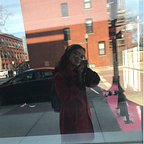How Trauma Informs Fiona Apple’s “Fetch the Bolt Cutters”
Fiona Apple presents Fetch The Bolt Cutters amongst a period which mirrors the undercurrents of her own work: vulnerability, trauma, apprehension. The passage of time since her release of The Idler Wheel Is Wiser Than the Driver of the Screw and Whipping Cords Will Serve You More Than Ropes Will Ever Do eight years ago has bestowed countless more uncertainties amongst our personal lives, though FTBC provides a warm (if temporary) return to familiarity — a pole around which we may all coalesce and reminisce, if only for a bit.
My love for Apple initially blossomed from the earlier seeds of her work — particularly in the thick of When the Pawn…, her sophomore album released in 1999 — though many of the same themes culminate in the release of FTBC. What I appreciate is that the progression of these tracks is sonically genuine in the same way her messages are; real, raw, and unfiltered. Percussion heavily dictates the flow and feeling of the tracks, such as it does in “Relay”, though various wispier elements remain skillfully suspended in harmony.
Her bold vocals cautiously guide us through the complexity of this album, and it is through her lyricism — both overt and subtle — that she makes explicit the darker undertones often attributed to her work. Apple preaches a twisted credo of womanhood, though it is precisely this notoriety that garners a broad audience; we deeply feel her struggles, too.
Apple was raped at the age of twelve. She has strayed away from explicitly referencing her abuse in the past, though several tracks in Fetch the Bolt Cutters offer an unfiltered look into the fray. “For Her” begins with a percussive, upbeat, and flighty melody, though collapses into a wistful quire of haunting voices towards the latter end. Apple mirrors the shocking progression of the track in her line, “You raped me in the same bed your daughter was born in”. An interview with Apple reveals she partially wrote the song for an old friend grappling with her own rape, though she utilizes this to mediate her own struggle with expression: “It started out me wanting to write something about my own feelings, but it was just too hard. I wanted to make it about not just me but about other people,” she claims.
Indeed, artists like Apple are oft able to help us understand and begin to articulate our own stories. Her personal, heart-gripping relatability consistent in her entire discography is what makes this album personal to me, and I genuinely feel that others can find mirrors of their own in her work.
Apple insightfully notes what effect the poisonous vestiges of trauma can have in the track “Relay”, where she muses on its pernicious, cyclical nature. Amongst the bold, flitting drums on this track she spits, “Evil is a relay sport / When the one who’s burned / Turns to pass the torch.” While reflecting on “Relay” shortly after the release of her album, Apple states, “[If] you get burned by somebody, when the person who burns you doesn’t acknowledge it — which rarely happens to people, acknowledging when they’ve burned you — it turns into you not knowing what to do with it. Then you just put it on somebody else”. Her intuitive musings on the progeny of trauma are ubiquitous; the line reminds me of an instance in which poet Philip Larkin expresses a similar sentiment in This Be the Verse. Larkin despondently broods over family trauma, proclaiming: “Man hands on misery to man / It deepens like a coastal shelf.” That is, Apple’s situation does not exist in a vacuum, and we can all take a lesson from the times in which artists must wrestle with the heinously cyclical nature of trauma.
— — — — — — —
